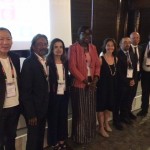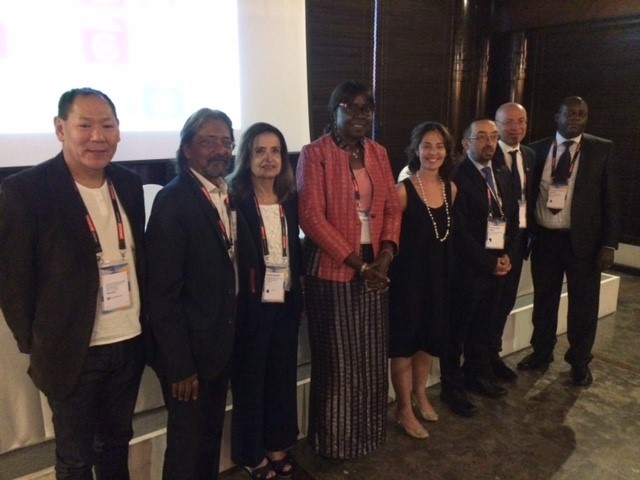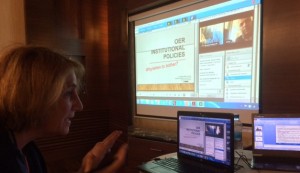Universal access to information, UNESCO and eLearning Africa 2017

The Research Institute for Innovation & Technology in Education (UNIR iTED) had the honour and the responsability of being a speaker at the International day to universal access to information (IDUAI 2017), organised by UNESCO and hosted by the Government of Mauritus. The congress is happening today, September 28th, 2017, along with the 12th eLearning Africa, and over 600 participants from 100 countries. In collaboration with the UNESCO Chair on eLearning and ICDE Chair on Open Educational Resources (OER), both supported by Universidad Internacional de La Rioja (UNIR), UNIR iTED has presented that access to open education is universal, in a solidary but realistic way. At the panel “Leave no one behind”, focused in inclusive access, and represented by half a dozen of countries, I have ve had the chance to highlight that functional diversity is an increasing reality in our Society, not just because of disabilities, but also because the fact of growing older and losing faculties, which requieres a specific support but also a normalization in order to avoid exclusion. Furthermore, OER access is a right for everyone and, because of that, it should benefit from a further deployment and implentation. A few issues are still missing in this field to become more effecive like, e.g. an acreditation system or a quality process, or an explotation plan for both, mid and long-term.

In exchange, there is an increasing movement, an increasing awareness, diverse and international, about Open Education, which shows the quite but strong effort made by educators all over the world: Athabasca University, South Africa University, Open Education Consortium, OER Foundation, International Council for Open and Distance Education UNESCO, Commonwealth of Learning and so many others. In this line, UNIR has designed and approved the first intitutional statement about open education by an online university, as we presented at the “Key issues to design and implement a National declaration about Open Education” workshop, at eLearning Africa. Nowadays, UNIR provides a 25% of open educational materials, and is commited to reach the 60% by 2020. UNIR colaborates with all the mentioned institutions, and, thanks to the generosity and the open perspective from them, Open Education is integrated in debates, action plans, policy and statements redaction, and development actions in work fields. No doubt that now is the moment for action.

IDUAI 2017 means one more step in a long journey. We expect to hear more about accomplished facts than goodwill ideas which require specific development plans. We should take advantage of the momentum: Thousand of educators (from teachers to administrators, going through content authors) and hundred of countries designing policies, open repositories, integrated working groups, and a long etcetera of particular actions for an efective implementation of an universal and open education. However, we must be realistic. Not everything can be free and open for everyone. Balance is possible, because someone has to pay, both with time and effort. To find the right balance, mutual benefits for both sides, and not just altuism on the one hand and needs on the other, is essential if we want this huge movement to make the right progress. A coordinated action is necessary and possible, for the universal access to information and for the design, production, editing and use of OER, research data, research results and all the rest of pillars of open education.
Daniel Burgos
Mauricio, September the 28th, 2017
PS: Workshop “Key issues to design and implement a National declaration about Open Education”
Presentations (PDF format)
- Daniel Burgos, Research Institute for Innovation & Technology in Education (UNIR iTED), Universidad Internacional de La Rioja (UNIR), Spain
- Andreia Inamorato Dos Santos, Joint Research Centre, European Commission, Spain
- Khalid Berrada, UNESCO / Cadi Ayyad University, Morocco & Ahmed Almakari, Ibn Zohr University, Morocco
- DVO_OER Policy slides, University of Coventry, UK
- Francisco García-Peñalvo, University of Salamanca, Spain (Additional notes)
- Vera Queiroz & Edison Spina, University of Sao Paulo, Brazil
- Christian M. Stracke, Open University of the Netherlands (OUNL), The Netherlands
- Fabio Nascimbeni, Research Institute for Innovation & Technology in Education (UNIR iTED), Universidad Internacional de La Rioja (UNIR), Spain
Full recordings of the session (Adobe Connect format)
- 27/09/2017 13:12h. http://unir.adobeconnect.com/pzm113hpdoa9/
- 27/09/2017 13:28h. http://unir.adobeconnect.com/pllh4f90zcn0/
- 20/09/2017 14:00h. http://unir.adobeconnect.com/phm126luf2l6/
